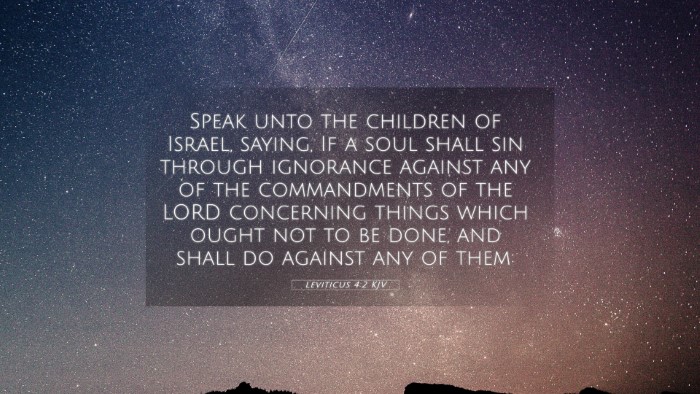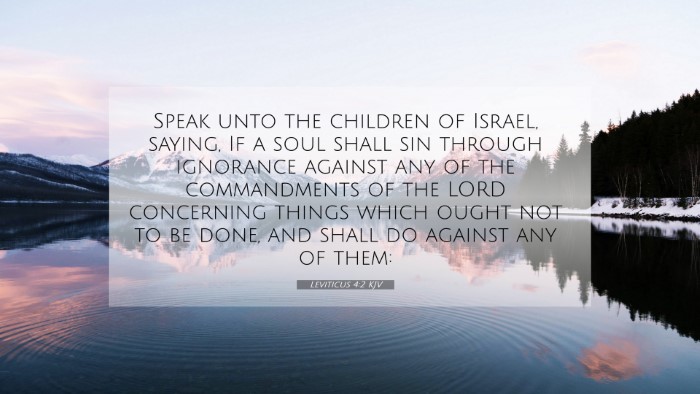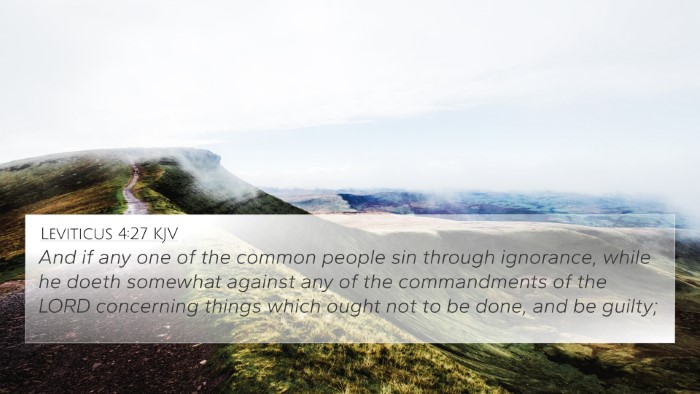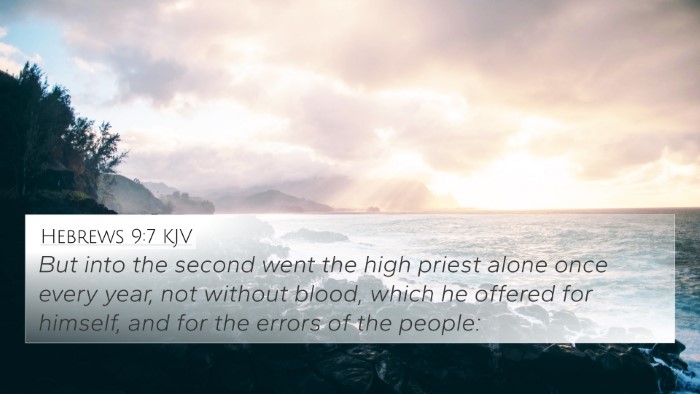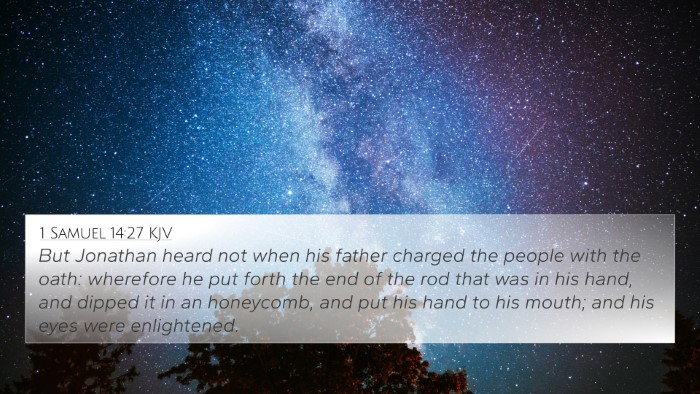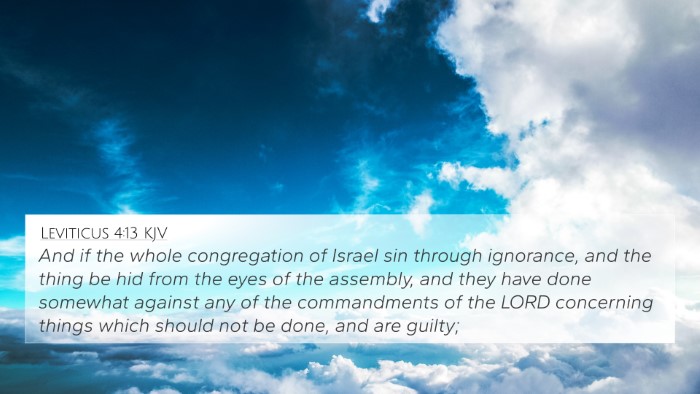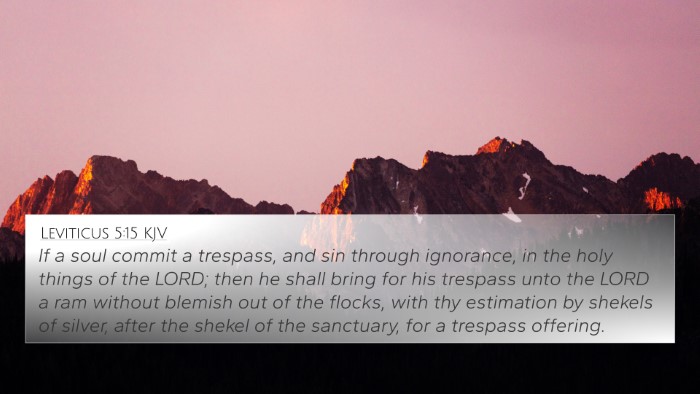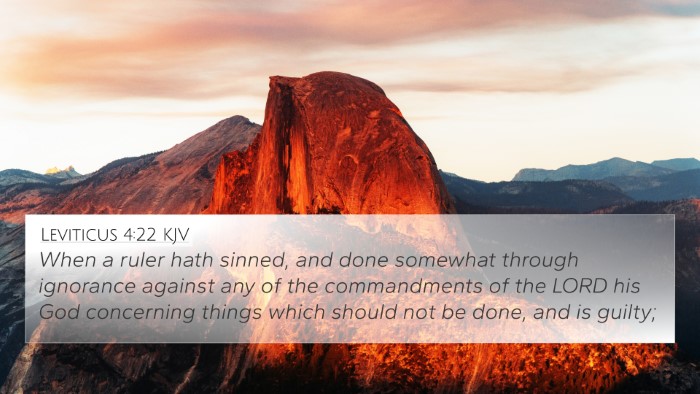Understanding Leviticus 4:2
This Bible verse is central to the understanding of sin offerings in the Old Testament, providing insights into God’s justice and mercy. Leviticus 4:2 states:
"Speak unto the children of Israel, saying, If a soul shall sin through ignorance against any of the commandments of the Lord concerning things which ought not to be done, and shall do against any of them."
Verse Meaning and Explanation
Leviticus 4:2 introduces the laws regarding the sin offerings which were to be made for unintentional sins. Various public domain commentaries shed light on this verse:
-
Matthew Henry notes that the term "ignorance" highlights God's provisions even for those who sin unwittingly. It emphasizes that inadvertent transgressions still require atonement.
-
Albert Barnes explains that the phrase "a soul shall sin" refers to an individual responsibility in sinning against God's commandments. It underlines the serious nature of God's laws and the importance of understanding them to avoid sin.
-
Adam Clarke elaborates on the distinction between deliberate and unintentional sins. He highlights that God provides a way for reconciliation even when sinners are unaware of their wrongdoing, which reflects the mercy of God.
Thematic Connections
The themes found in Leviticus 4:2 resonate throughout the Bible, establishing significant connections between various scriptures:
- Hebrews 9:22 - Highlights the necessity of blood for remission of sins, linking to the sacrificial system initiated in Leviticus.
- James 4:17 - Discusses sin of omission, reinforcing the concept of unintentional sin.
- Romans 3:23 - Covers the universality of sin, reminding that all fall short of God's glory.
- 1 John 1:9 - Encourages confession of sins, assuring believers of forgiveness.
- Psalm 19:12-13 - Speaks to the concept of hidden faults and unintentional sins.
- Leviticus 5:17 - Further elaborates on sin through ignorance and the required guilt offering.
- Numbers 15:24-25 - Expands on offerings for unintentional sins, establishing context for communal atonement.
Bible Verse Cross-References
Connections between Bible verses through themes, relationships, and principles carry significant weight in biblical interpretation. Leviticus 4:2 serves as a foundation for understanding sin, atonement, and God’s provision for His people. Here are crucial cross-references related to this verse:
- Exodus 20:1-17 - The Ten Commandments provide the foundational laws against which sin is measured.
- Matthew 5:18 - Affirms the importance of the Law, reinforcing that even the smallest detail holds significance.
- Luke 12:47-48 - Discusses varying degrees of accountability for knowledge of God's will.
- Acts 17:30 - God overlooked ignorance in the past but now calls everyone to repent.
- John 1:29 - Introduces Jesus as the Lamb of God who takes away the sin of the world, completing the sacrificial system.
- Romans 5:12 - Explains how sin entered the world through one man, showing the need for atonement.
- Galatians 3:24 - The law served as a tutor leading to Christ, connecting the Old Testament practices with New Testament grace.
Practical Applications
Understanding Leviticus 4:2 is vital for both historical context and practical applications in the lives of believers today. It provides:
- Awareness of Accountability: Every individual is responsible for their actions, even when unaware of wrongdoing.
- Encouragement to Seek Forgiveness: Believers are reminded to confess unintentional sins, trusting in God's mercy for atonement.
- Inspiration for Consecrated Living: Understanding sin and atonement leads to a life focused on holiness and obedience to God's commandments.
Conclusion
In Leviticus 4:2, we see God's divine instruction concerning sin and atonement. The grace exhibited in providing means for reconciliation even in ignorance points to the larger narrative of redemption found in the entire Bible. By employing tools like a Bible concordance or a Bible cross-reference guide, believers can explore the rich connections across scriptures, deepening their understanding and fostering a comprehensive approach to biblical study.
Engaging in cross-referencing Bible study methods enhances one’s ability to uncover the depth and breadth of God's Word, revealing inter-Biblical dialogues that are crucial for a full understanding of theological truths.

